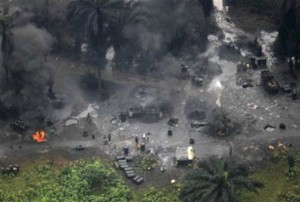Nigeria V.P.: Country must offer work to illegal refiners to reach peace
PORT HARCOURT, Nigeria (Reuters) -- Nigeria needs to offer work to people who make a living from illegally refining oil in the Niger Delta in order to achieve peace there, the African oil-producing nation's Vice President Yemi Osinbajo said on Tuesday.
The government has been holding talks with militants to end attacks on oil pipelines which cut the country's output by 700,000 barrels a day for several months last year.
But a military crackdown on thousands of illegal refineries in the southern swamps, which process crude oil stolen from oil majors and state oil firm NNPC, has raised tensions again.
Illicit refineries process stolen crude in makeshift, blackened structures of pipes and metal tanks hidden in oil-soaked clearings deep in the Niger Delta's thick bush land.
"Our approach to that is that we must engage them (illegal refiners) by establishing modular refineries so that they can participate in legal refineries," Osinbajo said during a visit to Rivers state, part of the Delta region.
"We have recognized that young men must be properly engaged," he said, without giving details.
He also said the government would make more provisions for an amnesty scheme for former militants who laid down arms in 2009 in exchange for cash stipends and job training.
Illegal refining is one of the few businesses flourishing in an otherwise desolate region, as petrol is scarce in Nigeria due to the country's derelict state refineries.
Authorities had originally cut the budget for cash payments to militants to end corruption but later resumed payments to stop surging pipeline attacks crippling vital oil revenues.
"We have make more provisions for amnesty and provisions for social intervention," Osinbajo told residents of Port Harcourt, the region's major city. He has been visiting the Niger Delta since last month to calm tensions.
The militants and residents who sympathize with them say they want a greater share of Nigeria's oil wealth to go to the impoverished region.
Crude sales make up about 70 percent of government revenue and the attacks have deepened an economic crisis brought on by low global oil prices.
Nigeria last put its crude output at between 1.7 MMbpd and 1.8 MMbpd, down from the 2.2 MMbpd at the start of 2016.
Reporting by Tife Owolabi; Writing by Ulf Laessing; Editing by Jason Neely and Alexander Smith







Comments